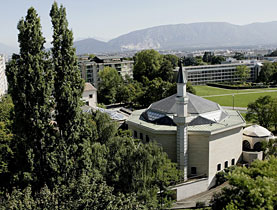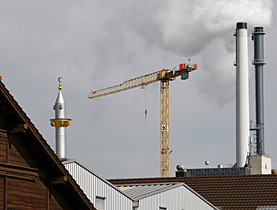Oldest minaret is part of the Zurich scenery

Switzerland's first minaret raises no eyebrows in the exclusive Zurich area of Balgrist where it stands – unlike the initiative to ban minaret construction.
The symbolism could not be more striking: two “bell” towers face each other, one square, grey and imposing, the other slim, short and white. In Balgrist the Mahmud mosque and the Swiss Protestant church stand opposite each other.
But in this rich neighbourhood of eastern Zurich the minaret is just part of the scenery. A passer-by from nearby Zumikon says she never noticed it before. “Is it new then?” she asks, her eyes widening in surprise when she hears it was built in 1963.
On June 22 of that year high society turned out for the inauguration, including the former Pakistani foreign minister Zaffrullah Khan and mayor of Zurich Emil Landolt.
It wasn’t until later that controversy broke out, and even then it was short-lived. The Neue Zürcher Zeitung recalled in 2006 that at the city parliament certain representatives of Christian churches had criticized the executive for granting land to a “sect” and exonerating it from paying tax.
The mayor had responded that freedom of belief and conscience were a right for everyone. Moreover, the Protestant Church and the Zurich authorities prided themselves on their openness and tolerance. As an international city that attracted many foreigners, Zurich had to receive these people in a dignified way. End of discussion.
Today the pastor of the Protestant Church in Balgrist also stresses Zurich’s urban and international image.
“In a modern city like Zurich, a mosque is taken for granted,” said Jürg Kaufmann. “But in other places, in the country for example, that would be less self-evident. But you can’t build churches anywhere you want, either.”
Peaceful co-existence
“We have had a good relationship overall since the beginning,” added the pastor. “We allow the mosque use of our parking spaces for Friday prayers and we also rent out rooms to the Muslim community. But as in every relationship there are some areas where we get on well and others where there is a little friction.”
For Kaufmann the segregation of women is a sensitive point and “more a political than a religious issue”. It also raised the issue of integration, he said. “To what extent do the immigrants accept our culture?”
The owner of the baker’s next to the mosque does not want to comment, but Felix Härter, who is out shopping, stops to answer questions. “The minaret does not bother me at all and I will vote no on November 29,” he said.
“If there was a muezzin [calling Muslims to prayer] that would be a different matter.”
Kaufmann confirms that this is a cause for anxiety. “If there was a request for such a thing, it would be very controversial. We have had to wrap our bells in acrylic glass to lower the decibels.”
In the end, the most critical person is a passer-by of Serbian origin: “Whatever happens, the result will be bad. If it’s yes to a ban, Switzerland will appear intolerant. If it’s no, minarets will spring up like mushrooms. The Emirates have plenty of money, they could build a minaret overnight.”
No minarets for Mohammed
These fears are quashed by Lahoussine Kharbouch of the Association of Islamic Organisations of Zurich. The accountant of Moroccan origin welcomes people in one of the biggest Arab-language mosques, the Al Hidaya, situated in a row of rundown houses in Altstetten to the west of Zurich.
“We don’t need minarets, we need places of prayer and where we can teach our children,” he said. “Anyway, [the Prophet] Mohammed didn’t have minarets.”
“The minaret is an architectural symbol which exists in those communities which are relatively prosperous and where they want to attract people of a certain rank,” he continued.
“But if the initiative is rejected, as I hope it will be, Muslims will have an even greater loyalty to their adopted homeland than at present.”
Ariane Gigon in Zurich, swissinfo.ch (Translated from French by Morven McLean)
According to the government, there are 130-160 Muslim cultural centres and prayer rooms in Switzerland, and four mosques with minarets:
– The Mahmud mosque in Zurich, inaugurated in 1963.
– The Petit-Saconnex mosque and Islamic cultural foundation in Geneva, opened in 1978.
– The Albanian Islamic cultural centre mosque in Winterthur, opened in 2004.
– The mosque of the Turkish cultural association in Wangen near Olten, inaugurated in 2009.
The minaret plans of Wangen (since built), Langenthal outside Bern and Wil (eastern Switzerland), neither constructed as yet, were what prompted anti-minaret campaigners to launch the initiative on banning their construction. The vote is held on November 29.
Islam is the third-biggest faith group in Zurich, after the Catholics (32%) and Protestants (27%).
The roughly 26,000 members of this community represent about 7% of the city’s population.
There are 18 mosques in Zurich for the 20 or so Muslim communities, most of which are Sunni.
In comparison, the city has 11 synagogues, 6 Orthodox churches and 3 Buddhist and Hindu temples.

In compliance with the JTI standards
More: SWI swissinfo.ch certified by the Journalism Trust Initiative













You can find an overview of ongoing debates with our journalists here . Please join us!
If you want to start a conversation about a topic raised in this article or want to report factual errors, email us at english@swissinfo.ch.